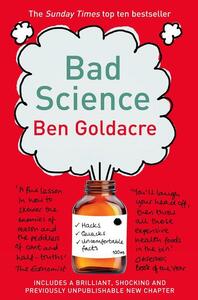You need to sign in or sign up before continuing.
Take a photo of a barcode or cover
informative
medium-paced
A fascinating and sometimes chilling look at crank remedies, crackpot theories and medical frauds. Ben Goldacre has written an approachable and informative book that discusses bad science practices and the often devastating effect such methods and their practitioners can have on our health.
Goldacre leaves no stone unturned in the defence of medical science and Gillian McKeith (self-styled “nutritionist”) comes in for the most criticism. He recounts tales of horror from victims of the homeopathy fad. Neither does the medical profession get off lightly, he acknowledges and criticises the flaws in the system and what happens when big business interferes in the scientific process.
His biggest tonguelashing is reserved for the media who distort press releases and twist stories to sensationalise actual findings, leaving them barely resembling the real report. They created the travesty of Andrew Wakefield, he says (and not without justification) and they never learn their lesson, only they repeat it time and time again.
After reading this, you will never trust another science report as expressed in the media again.
See more book reviews at my blog
Goldacre leaves no stone unturned in the defence of medical science and Gillian McKeith (self-styled “nutritionist”) comes in for the most criticism. He recounts tales of horror from victims of the homeopathy fad. Neither does the medical profession get off lightly, he acknowledges and criticises the flaws in the system and what happens when big business interferes in the scientific process.
His biggest tonguelashing is reserved for the media who distort press releases and twist stories to sensationalise actual findings, leaving them barely resembling the real report. They created the travesty of Andrew Wakefield, he says (and not without justification) and they never learn their lesson, only they repeat it time and time again.
After reading this, you will never trust another science report as expressed in the media again.
See more book reviews at my blog
informative
medium-paced
Contains some interesting examples of why you shouldn't always listen to (or at least shouldn't always believe) 'the experts'.
A must read, particularly for those who will never pick this book up. I found this to be slow at the start; maybe poor nutrition advice, homeopathy and nonsense health advise have become more accepted as BS in the decade since this book was published (maybe not)? That said, I learned a lot of terrifying specifics about many relevant topics!This should be required reading in high school psychology/health classes.
Reading this was quite an eye-opener. What started as a lighthearted, witty talk, by the end of the bok took some serious turns, for the good. Not only I learned about how one should assess scientific knowledge but also how it can be manipulated by some quacks and cranks for their own gain, risking lives of numerous innocents. Well, that justifies the aggressiveness of the author. But there is hope in this and I will stand by it, by science.
I'd recommend that everyone should read this book. I don't care what the review says, you can decide what you agree with or not after reading.
I'd recommend that everyone should read this book. I don't care what the review says, you can decide what you agree with or not after reading.
Interesting; fast read; good introduction to basic statistics and scientific methodology...however, he's seriously ranty. Two thirds of the way through most chapters I jumped forward because he had devolved into ranting. The first 2/3rds were fun though.
*3.5⭐️
My only disappointment is that going into this book, I thought I would be learning more about how to interpret date and statistics to make the best judgments/arguments regarding scientific studies. This book provides more of an application of someone who has already interpreted the data and their take on it, which is fine—and was still very insightful, it just wasn’t exactly what I had hoped for from this book. What I enjoyed the most about this book is the doctor speaking to the audience like they are not incapable of understanding scientific concepts, even without formal training, that if you have a passion for science, it is available to all.
My only disappointment is that going into this book, I thought I would be learning more about how to interpret date and statistics to make the best judgments/arguments regarding scientific studies. This book provides more of an application of someone who has already interpreted the data and their take on it, which is fine—and was still very insightful, it just wasn’t exactly what I had hoped for from this book. What I enjoyed the most about this book is the doctor speaking to the audience like they are not incapable of understanding scientific concepts, even without formal training, that if you have a passion for science, it is available to all.
funny
informative
reflective
medium-paced
I expected more information and background about the science itself, but the book focuses more on media, journalism and personalities. Personalities I never heard about before, because I'm not in the UK and it's no longer 2008. But the theme is also still relevant. On some points more relevant than ever, since social media is even worse than the media he's fighting against. There are some useful bits throughout about what to pay attention to, to spot the bad science and unscientific reporting. They're well explained and easy to understand. Yet I had hoped for more.



